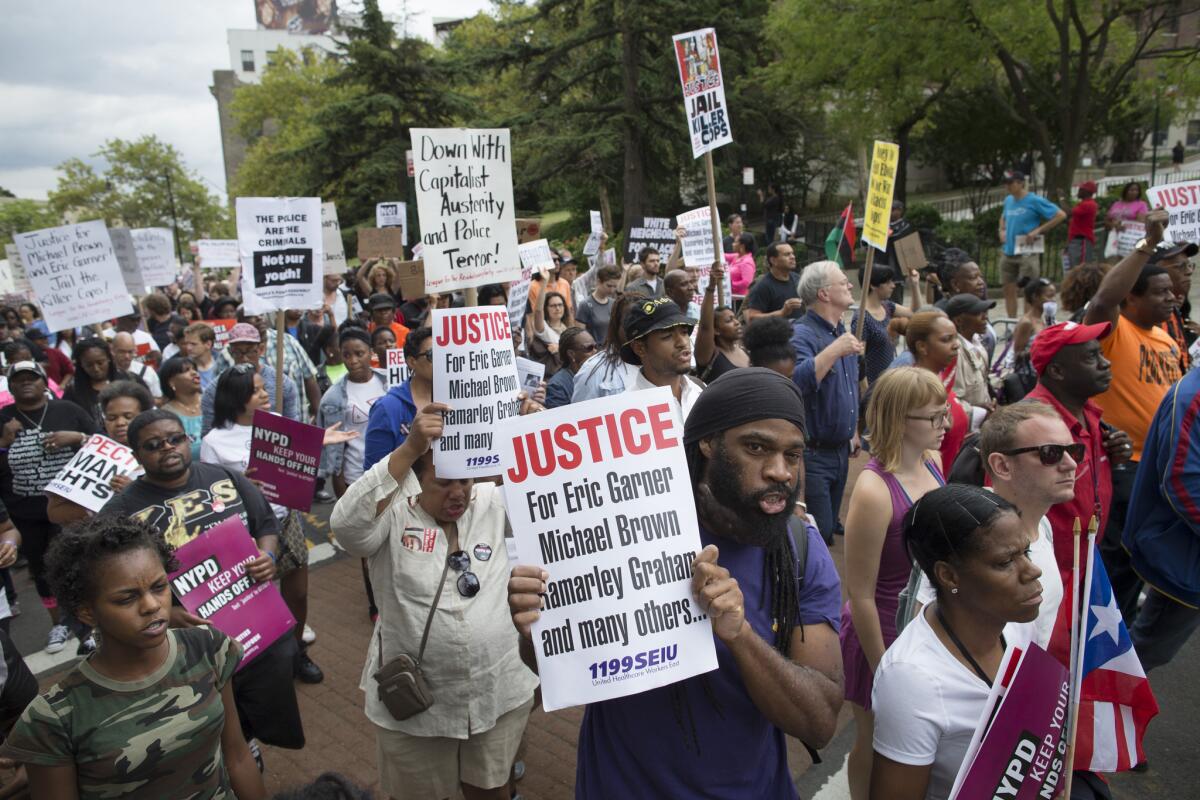New York City review board may not see Eric Garner grand jury records, judge rules

Demonstrators in August 2014 protest the death of Eric Garner in Staten Island.
- Share via
A judge has once again blocked the release of sealed grand jury records related to the death of Eric Garner at the hands of New York City police officers last summer.
The city’s Civilian Complaint Review Board, an advisory panel that monitors NYPD practices, sued to obtain copies of grand jury testimony this year after repeated challenges to make the records public had failed.
The review board did not plan to make the records public, according to an agency spokeswoman; rather, it intended to use them in its internal investigation of Garner’s July 2014 death.
In a 15-page decision, however, Justice William E. Garnett wrote that the board did not provide a compelling reason for the release of the records. Garnett also said it would be impossible for the board to ensure the records would not be made public.
Grand jury information generally remains secret under New York law, and only the prosecuting district attorney can apply for a release of that information.
“The CCRB’s assurance that the minutes would be safe from any public dissemination is unconvincing,” Garnett wrote. “There is no way to know how many board members, investigators and staff would have access to any released minutes. There is also no way to hold anyone directly accountable for unauthorized leaks or negligent disclosures.”
The chairman of the review board, Richard Emery, said the panel would appeal the decision.
“Judge Garnett’s opinion studiously avoids the facts and the law. The facts are that we have the complete cooperation of the Police Department,” Emery said in a statement. “But to do a complete investigation with sworn testimony, our procedures require that we get all the evidence, which would certainly include the grand jury minutes.”
In an interview with the Los Angeles Times, Emery said the NYPD has provided the board with some information contained in its internal review of Garner’s death, including his autopsy. But statements made by witnesses and police officers, as well as testimony and evidence shared during the grand jury proceedings, remain secret.
“You don’t do an investigation of an event like this without getting all the statements, especially from the witnesses who were involved,” he said. “This is extremely important evidence which we are entitled to.”
The NYPD has completed its review of Garner’s death, though the findings have not been made public, Emery said. The Police Department did not review the grand jury testimony before completing its investigation, he said.
Phone calls and emails to an NYPD spokesman seeking comment were not immediately returned.
Garner, a 43-year-old father of six, died July 17, 2014, in a clash with New York Police Officer Daniel Pantaleo and several other officers in Staten Island. Garner, who had previous run-ins with the NYPD, protested the officers’ decision to arrest him on suspicion of selling untaxed cigarettes.
The verbal clash turned physical, and video taken by a bystander shows that Pantaleo wrestled Garner to the ground while placing him in what appears to be a chokehold, a take-down tactic that is outlawed by the NYPD and nearly all other major police departments in the U.S.
“I can’t breathe,” Garner can be heard saying repeatedly in the video as he gasps for air, before dying.
A Staten Island grand jury declined to indict Pantaleo in December, just days after a St. Louis County grand jury decided not to bring charges against Ferguson, Mo., Police Officer Darren Wilson in the shooting death of Michael Brown. Pantaleo and Wilson are white; Garner and Brown were black.
Both decisions set off mass protests around the country and have become emblematic of tension between law enforcement officers and minority communities.
The New York Civil Liberties Union, the National Assn. for the Advancement of Colored People, the New York Post and the city’s public advocate also sued to make the grand jury records public, but Garnett ruled against them in March.
Although the civilian review board only has the power to make recommendations to the NYPD on disciplinary matters, Emery said the board wanted to conduct a full review. If a three-member panel finds reason to bring disciplinary charges against Pantaleo or the other officers involved in the incident, board members could then essentially prosecute the officers at a police trial.
The NYPD has yet to begin disciplinary proceedings in connection with Garner’s death. In cases of officer misconduct, internal affairs proceedings are usually delayed until the completion of all criminal proceedings.
The grand jury process ended late last year, but the U.S. Department of Justice is still reviewing Garner’s death.
Follow @JamesQueallyLAT for breaking news
More to Read
Sign up for Essential California
The most important California stories and recommendations in your inbox every morning.
You may occasionally receive promotional content from the Los Angeles Times.













